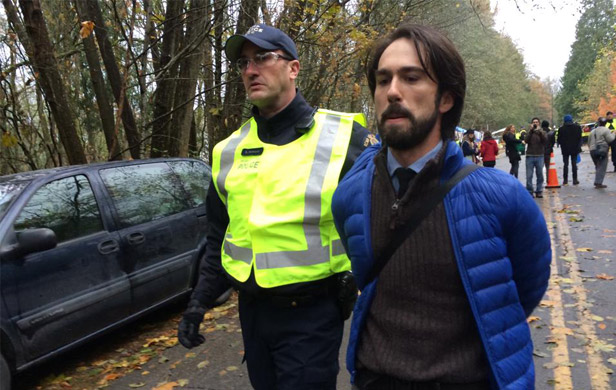While you are out this weekend enjoying the last days of summer on the beach and the RCMP come by to check whether your cooler is full of (gasp) beer or wine, you have every right to tell them (I would suggest politely) that no, they cannot look in your cooler.
Now I am not a lawyer (although I did consult one to write this article), so don’t come looking for me if the whole exchange doesn’t go smoothly, but the law is very clear in Canada that the police only have a right to search your cooler if they have reason to suspect you have alcohol or something else illegal in inside.
And this extends to all sorts of other things, like driving your car, which reminds me of the old police shows where the local rebel is pulled over and when he asks the sheriff why he was pulled over the sheriff pulls out his baton, smashes a tail light and says, “broken tail light.”
Even the redneck sheriff knows that in order to pull a person over he has to have a reason for doing so.
In Canada, we have a reasonable expectation of privacy. We have the right to go about our lives without being bothered by the police, unless the police have a justifiable reason for doing so.
In fact this rule is so important that it is embedded in the Canadian Charter of Rights and Freedoms under section eight, which states that:
[quote]Everyone has the right to be secure against unreasonable search or seizure.[/quote]
While section eight of the Charter protects all sorts of things, one of the biggies is our right to a reasonable expectation of privacy.
So unless you are acting like a drunk idiot at the beach this weekend, it is reasonable for you to expect your privacy and the RCMP cannot butt into that privacy by demanding (or even politely asking) to see the contents of your cooler, backpack or whatever other personal belongings you have with you.
National insecurity
If it is the case that the police, or any other form of law enforcement, are not allowed to search you or our belongings without reason, how could it be okay in Canada for law enforcement to search and seize our personal information and digital conversations without probable cause?
The RCMP might not have reasonable grounds to search your drink cooler while you lay on the beach, but under new laws rammed through with little debate by Stephen Harper and his Conservative government, law enforcement agencies like the RCMP and the Canadian Security and Intelligence Service (CSIS), will have more power than ever to monitor, collect and share the information you are transmitting on that fancy new iPhone 6 Plus of yours, or any other electronic device you have.
Your right to privacy is extended to online activities, which was confirmed in a 2013 Supreme Court of Canada case involving Telus, in which the court ruled that Canadians should have a reasonable expectation of privacy when it comes to electronic transmissions like text messaging and emails.
So what is the government to do if it has a burning desire to monitor more of its citizens’ activities – especially online – in the name of national security?
What the Harper government did with Bill C-51 is loosen the definition of what behaviours are considered an indication of potentially illegal activity. By broadening the definition of what activities are considered a possible threat to national security, the government now has more reasons to monitor your behaviour.
Loosening and broadening the definition of what is an indication of possible criminal activity is the key trick in Bill C-51 and harms your right under the Canadian Charter of Rights and Freedoms to a reasonable expectation of privacy.
“Critical infrastructure”

It is in the definitions section of the final version of C-51 that was passed June 15, 2015 where we can see the introduction of very broad terms to define what is an “activity that undermines the security of Canada.”
For instance, one such activity that would undermine the security of Canada (according to C-51) is the “interference with critical infrastructure.” In the context of pipeline protests this is a cause for concern for those citizens who want to show up and voice their opposition to the construction of a pipeline.
In the definitions section of C-51 there is a statement that, on the surface, would seemingly protect pipeline protestors: “For greater certainty, it does not include advocacy, protest, dissent and artistic expression.”
But it is the broadness and vagueness of this text that is concerning, especially when Conservative party members have a history of labelling those speaking up on environmental issues as “eco-terrorists.”
Human rights, Canada’s reputation at risk
Again though, I am not a lawyer, but here’s what a group of prominent experts, including 106 law professors, had to say about C-51:
[quote]Protecting human rights and protecting public safety are complementary objectives, but experience has shown that serious human rights abuses can occur in the name of maintaining national security. Given the secrecy around national security activities, abuses can go undetected and without remedy. This results not only in devastating personal consequences for the individuals, but a profoundly negative impact on Canada’s reputation as a rights-respecting nation.[/quote]
Stephen Harper, the hypocrite
The kicker here is that while the Harper government wants to invent new reasons to watch what you do, the same does not go for Prime Minister Harper himself, who is so tight with his own information that he is rarely even willing to talk to the media!
Stephen Harper wants you to be willing to give up your privacy, but is not willing to make his activities and those of his government more transparent and open.
Glenn Greenwald, the journalist and constitutional lawyer who worked with whistleblower Edward Snowden to expose the massive intrusion of privacy by the US government against its own citizens and countries around the world, has a very well-thought-out opinion on why people should have a reasonable expectation of privacy and why if you are not doing anything wrong, you should still expect that privacy.
And on the hypocrisy of those, like Stephen Harper, who call for less privacy, but take steps to further protect their own privacy, Greenwald had this to say:
[quote]…the people that say that, that privacy isn’t really important, they don’t actually believe it. And the way that you know that they don’t actually believe it, is that while they say with their words ‘privacy doesn’t matter,’ with their actions they take all kinds of steps to safeguard their privacy. They put passwords on their email and their social media accounts, they put locks on their bedroom and bathroom doors. All steps designed to prevent other people from entering what they consider their private realm and knowing what it is that they don’t want other people to know.[/quote]
Watching over your back
In this election, like most elections in recent history, public safety is a hot issue, and every party wants you to think they have your back when it comes to protecting you, your family, friends and fellow citizens.
But there is an important line that needs to be drawn between watching your back and watching over your back.
Our right to a reasonable expectation of privacy is stated pretty clearly in our country’s Charter of Rights and Freedoms. It is a right that past generations fought and died for and not something to be taken lightly.
And our right to privacy is definitely not something that should be compromised by a new set of ham-fisted laws that were rammed into existence with little debate.
So vote smart in this election if privacy is something important to you, because it matters, and what is a law today can be changed by a new government tomorrow.
As a first step, go here to to see the official vote count and who voted for and against Bill C-51, and consider voting accordingly.
Or here’s the crib notes: the Conservatives and Liberals all voted in favour of C-51, while every other party voted against it.



Most Canadians truly do not understand the implications of what electing a government that insists on these breaches into our own privacy and
personal convictions will do for our natural and innate freedoms to just be ourselves. It’s none of their business as to how or what we believe,..and any measures taken to curb that safe place in a democracy should strongly indicate that governments insecurity and incapable capacity to govern. Harper puts on his best actors face, oh the innocent one we have seen over the years of suffering him,..filled with deceit and guile,..the one when he really shows that power and utter control are his only objective at the expense of everyday Canadians. Ever noticed his ever expanding ego whenever there’s an important person to to photographed next to or an event to attend where he can act as the power God itself;…for the sake of our privacy and personal freedoms V O T E HIM OUT OF OFFICE!!!
Then insist, that the next PM understands his place in the order of things, that he or she is but the servant of the people, not their image to worship, not their idol to follow down the road to bondage in a Harper like autocracy. Think before you vote! Vote for freedom,..that freedom our fathers fought for in all the wars against oppression.
Liberals voted en-masse for C-51. I have to assume that they did so in order that they not piss off one voter in the upcoming election. It certainly is a comment on how far we’ve come in Canada when elected reps are afraid to vote against a Bill that redefines unlawful civil protest as terrorism, effectively moving the government response to unlicenced political activism in under the protection of secrecy. ….And yet the election is all about the economy and prosperity were told!